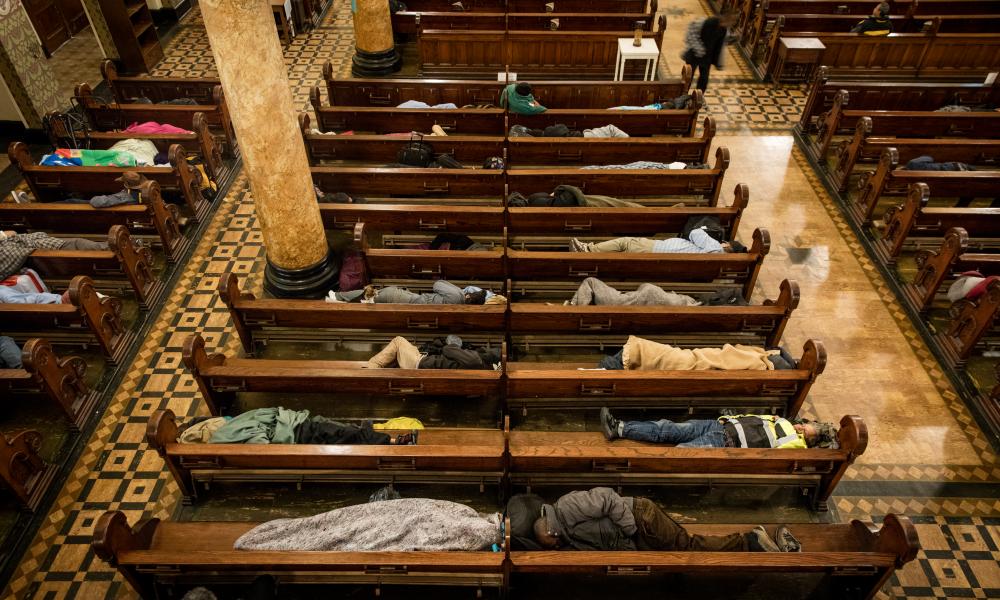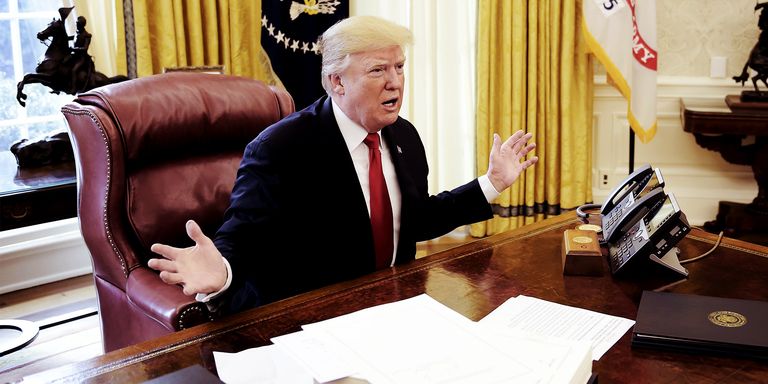Democracy Now
From The Guardian
“Bussed Out”: How Cities Are Giving Thousands of Homeless People One-Way Bus Tickets to Leave Town
WRFG Democracy Now! 12-28-17 #1
"Bussed Out": How cities are giving thousands of #Homeless people one-way bus tickets to leave. The story today (Thursday) at 5 pm on Democracy Now! with Amy Goodman.#WRFG #CommunityRadio #Atlanta wrfg.org
Posted by WRFG 89.3 FM on Thursday, December 28, 2017
Story December 28, 2017
A major new investigation by The Guardian examined how cities are struggling to solve the problem of homelessness throughout the year, and found many have come to rely on an old solution: a one-way ticket out of town. Relocation programs that offer homeless people free bus tickets to move elsewhere have been around for at least three decades. But as the homeless population rises for the first time since the Great Recession, relocation programs are becoming more common and are expanding to more cities. We speak with The Guardian’s homelessness editor, Alastair Gee, about many people who were bused out, remained homeless and eventually returned to the city they had left.
Guest: Alastair Gee, Homelessness Editor for The Guardian
Transcript
This is a rush transcript. Copy may not be in its final form.
NERMEEN SHAIKH: As much of the Midwest faces winter snowstorms and the East Coast faces freezing temperatures this week, many cities have issued Weather Emergency Alerts that allow them to place people who are homeless into emergency shelters. Well, today we talk about a new investigation by The Guardian that looks at how cities struggle to solve the problem of homelessness throughout the year, and found many have come to rely on an old solution: a one-way ticket out of town. Relocation programs that offer homeless people free bus tickets to move elsewhere have been around for at least three decades. But as the homeless population rises for the first time since the Great Recession, relocation programs are becoming more common and are expanding to more cities.
AMY GOODMAN: In its investigation, The Guardian closely examined these homeless relocation programs by compiling and analyzing a database of more than 34,000 bus trips or flights taken by homeless people out of their cities. They found the journey provided a route out of homelessness for some, but many eventually returned to the city they had left. This is 27-year-old Quinn Raber, who traveled nearly 2,300 miles over three days from San Francisco to Indianapolis by bus, only to return.
QUINN RABER: I wasn’t expecting to come back to San Francisco as soon as I did, but I knew I was going to end up coming back eventually. The roughest part about being homeless is the wear and tear from the concrete and the constant walking. And it’s hard to use the restroom, because a lot of businesses don’t want homeless people in their restrooms and messing them up. You know, it really breaks you down. I don’t know if I would ask Homeward Bound for a ticket again, just because I know that you’re not really supposed ask for more than one. But if they—you know, if they would be willing to help, I’d ask them. You know?
AMY GOODMAN: For more, we’re joined in San Francisco by Alastair Gee, the homelessness editor for The Guardian, the new investigation by the Outside in America team headlined “Bussed out: How America moves its homeless.”
Alastair, welcome to Democracy Now! Just lay out what you found.
ALASTAIR GEE: Thank you so much for having me.
Well, we made dozens of public records requests. And our goal was to really understand what effect these bus programs were having on the homeless population in America. Cities, of course, would say that these programs are a really great way to offer people more stability. It’s a way to reconnect people with family or with friends in other locations and perhaps offer them a route out of homelessness. And we found that while in some cases that was certainly what happened, for some people it certainly was a way to greater stability, for others it wasn’t quite that simple. We found cases where people simply became homeless at their destination. In some instances, they even became homeless again in the city from which they had departed. So, the story really isn’t quite as simple, and it really isn’t quite as rosy a picture as cities would portray.
NERMEEN SHAIKH: According to a new federal study, the U.S. homeless population, as we said earlier, rose this year for the first time since the Great Recession. What do you know about why that is and what the impact of that has been?
ALASTAIR GEE: Right. That’s a really good point. Well, the rise has been driven, in particular, by the trends that we’re seeing on the West Coast, and that’s to do with a rental affordability crisis. Everywhere from Seattle down to Los Angeles and San Diego, it’s simply becoming impossible for people earning, certainly, minimum wage, but even wages above that, it’s just—it’s very, very difficult to afford somewhere to live. So that’s what’s really driving the trend. And I think the picture, though, is in the background here, and it’s been a constant element of the homelessness crisis in the U.S., is a long-term federal underinvestment in affordable housing, something that was really begun, these cuts, in the Reagan era and, in the opinion of advocates, has never really been properly redressed since then.
AMY GOODMAN: This is 62-year-old Willie Romines, who took a bus from Key West to Ocala, Florida. He told The Guardian, because he accepted a free bus ticket from the shelter he was living in, he was barred from returning.
WILLIE ROMINES: It’s like, “Close the door. Get out of here. We bought you a bus ticket. You can’t come back.” That put a hurting on me. I feel like I was swindled. Since I’ve been banned from the shelter, I’ve stayed on Smathers Beach, behind buildings, behind bushes, hedgerows. I’ve slept next to dumpsters and stuff like that. They tell you anything, because they want you out of here. They want all the homeless out of Key West.
AMY GOODMAN: And this is Rose Thompson, a 58-year-old woman who relocated from Florida to West Virginia. She told The Guardian she went back to Key West only three weeks after leaving.
ROSE THOMPSON: I had a seizure and my heart stopped at the soup kitchen. So I wanted to go back to West Virginia and stay with my daughter. They were staying, it’s like, in a three-bedroom trailer. And then her little boy slept on the couch, where I was sleeping, so they wanted me to go to a homeless shelter. And I didn’t want to stay in a homeless shelter in West Virginia, because I don’t know anybody up there anymore. And from the time I left here to the time I got back, it was exactly three weeks.
AMY GOODMAN: So, if you can talk about these people, Alastair Gee, and talk about, you know, what their circumstances were? And also, how much are taxpayers paying for all of that, simply for them to return?
ALASTAIR GEE: Well, Willie was a person that one of our reporters met in Key West. And as you mentioned earlier, the Key West scheme is really unusual. Of the 15 or so programs from which we received data, Key West was the only one that had this stipulation. They essentially made you sign a kind of contract. If you went to the program and requested a bus ticket, they would ask you to essentially declare that should you return to Key West, that you wouldn’t avail yourself of homeless services there on the island again. And so, what this means is that you have people like Rose, for instance, who are sleeping on beaches, sleeping outdoors, because, essentially, they have taken a ticket. It didn’t work out, where they came from, and they’ve just ended up back in Key West.
So, in the case of Rose, for instance, she wanted to travel back to West Virginia, where she’s from, to stay with her daughter. She got back there. It turns out that her daughter simply wasn’t able to offer her the kind of support that she needed to find her way out of homelessness. Rose would be living in an overcrowded trailer. She was sleeping on a couch. And eventually, her daughter had to take her to a homeless shelter in West Virginia. So Rose ended up coming back to Key West, and that’s where she is now. And so she simply has no shelter. She has nowhere to stay. And so, she, unfortunately, is sleeping outdoors there.
NERMEEN SHAIKH: Well, Alastair—
ALASTAIR GEE: And I think you also—oh, please, go ahead.
NERMEEN SHAIKH: No, please, go ahead.
ALASTAIR GEE: Could you remind me of your other question?
AMY GOODMAN: Oh, talking about, you know, the cost to taxpayers, since what we’re talking about now is people who take these journeys, whether bus or plane, some feeling coerced, and then they end up back in the city they’re in.
ALASTAIR GEE: Right, right. Well, we have figures from the city of New York, for instance, which budgets half a million dollars per year for its program. And cities around the country, while not quite—they don’t have programs that are quite as large as the one in New York, I think we can safely assume that over the course of years, that cities are spending millions of dollars on these kinds of things. And it’s interesting because the efficacy of these programs. While cities would say that these are a good way to help people get out of homelessness, there really isn’t very much long-term research that testifies to that.
So, for instance, we spoke to the city of San Francisco and requested data from them. And they provided many, many years’ data, going back to the 2000s. But, for instance, for a 5-year period, between 2010 and 2015, when the city offered thousands of people bus tickets and thousands of people left the city, the city could only provide us records showing that it had been able to follow up with only three of those people to find out if their situation at the other end had improved. And that was really—that was a similar situation across the board. While a few smaller cities did have some long-term follow-up data, mostly they did not, and the cities really had no idea what happened to the people who had taken tickets out of their cities.
NERMEEN SHAIKH: And, Alastair, what did you find out about the percentage of people who opt to leave the cities they’re living in, the homeless people who opt to leave, and those who are, in some sense, coerced or forced to leave?
ALASTAIR GEE: Well, that’s a really good question. And I think it’s important to mention from the outset that the majority of people who are homeless in any given city are from that city. Whenever cities do their homeless population counts, they often do surveys, and they find this trend that’s replicated across the board. And so, it is actually a myth that—as is common in many cities in the West, that somebody is drawn there for the services or for the weather. Most people are actually from that city. But for the percentage, the small percentage, that aren’t from that city, these programs can be a good choice.
In terms of coercion, it wasn’t something that we found very often. These programs generally are voluntary. And the way it works is that someone would take themselves to a ticket office, and they would make a request for a ticket. And that’s how it would work. But in the case of one family in New York, the Ortiz family, we did find that they felt that they had been given no other choice than to take a ticket. Jose Ortiz, he told us that he had gone to the city’s homelessness department in the summer this year. His family, his young family, had been homeless in the city of New York, and he had requested some help, just in time, really, to help him get his family back on his feet. He says that the city determined that because he had, in their words, a better housing option on the island of Puerto Rico, that he wasn’t eligible for homeless services in the city of New York. And in his terms, as it was laid out to him, he was given only one choice, which was to take the plane ticket out of town.
AMY GOODMAN: Can you talk about what’s happening in San Francisco right now, which is experiencing a homeless crisis, looking at the impact that the number of people bused out of the city have? And also, right here in New York City, if you can talk about one of the first places to adopt this so-called relocation program?
ALASTAIR GEE: Yeah. So, to deal with the second point first, New York, as far as we could tell, was the first major city to launch a program. Its program came about in around 1987. And it hasn’t continued without pause since then. It was relaunched in its current form under Mayor Bloomberg. But it certainly has a lot of history there.
The program in San Francisco came about later, in around 2005. And officials in San Francisco told me that—in fact, a police commander told me that they were looking to the example of the city of Sacramento, and they thought, “Why can’t we have a program like that?”
And so, the effect, as you mentioned, on San Francisco’s homeless population has been quite dramatic. We looked at the homeless counts in San Francisco over many years, and we tried to calculate what the population in the city, the homeless population, would have been had this program not existed. And we did a very rough back-of-the-envelope calculation. And over the years, around 10-and-a-half thousand people have received bus tickets from San Francisco’s Homeward Bound program. And its homeless population today, on any one night, is around 7,000 to 8,000 people. And so, of course, our calculation doesn’t take into account people who might have come into San Francisco through other bus programs, for which we don’t have data, or people who have been—become homeless in San Francisco while living in San Francisco. But, very roughly, we estimated that the population of San Francisco could have been 18,000 homeless people on any one night, had this program not existed. So, that’s more than double the current population of around 7,000 to 8,000.
NERMEEN SHAIKH: Well, let’s go to Key West, Florida. You spoke also to a former shelter official there in Key West who defended the policy of banning people who have been relocated from returning. This is Mike Tolbert.
MIKE TOLBERT: The reason for a one-way ticket, we don’t want a revolving-door travel agency. If you let them come back, they’re going to want another ticket. And then you got the people, everybody wanting a ticket, everybody wanting to come back. And it’s just not going to work. The program will not work. The folks who take the bus ticket and complain about it, they think we owe them something. We gave you all we can give you. There is nothing else we can give you. I’m good with it.
NERMEEN SHAIKH: So that’s Mike Tolbert in Key West, Florida. Alastair, can you say how representative his example is of other homeless people in Florida and even elsewhere?
ALASTAIR GEE: Well, the Key West program, they were certainly the most, I would say, forthright about that kind of thing. As I mentioned, the Key West program did seem, in some senses, to be an outlier, I would say, because other programs emphasize more that this was more of a humanitarian effort to assist people. And Key West came down quite squarely—I suppose they would say that it was both a humanitarian thing, but also they were doing a good thing by reducing the population and by giving these people one-way tickets out of town. And so, I wouldn’t say that that attitude is extremely representative, but it is very, very unusual. And that’s why we sent some reporters there to meet people like Willie and Rose and, certainly, to hear more about their stories.
AMY GOODMAN: And the story of the person who was flown from New York to Puerto Rico, explain that program, and particularly now, after Hurricane Maria.
ALASTAIR GEE: Right. Well, the Ortiz family, as I mentioned, they took a plane to get back in August. And as they felt, it was under duress. They really didn’t want to go. It was a man, his wife, their two young children. And our reporter noticed that the parents were doing their best to put a brave face on it when they were at JFK. The kids were very, very happy to be getting on a plane. But the parents, they were really trying to mask their feelings about it. And so, they traveled back to Puerto Rico in August. We were able to stay in touch with them a little bit over Facebook. When Jose Ortiz returned to Puerto Rico, he messaged us to say that he had a job interview as a security guard, and so he was feeling optimistic about that. But once the hurricane had been through, it became hard for us to get in touch with him. And we really, despite our efforts, haven’t been able to get back in touch with them since then, and so we don’t know now how—how that family is doing, unfortunately.
AMY GOODMAN: Finally, taxes. That’s the big news of the Christmas and holiday weekends, as President Trump has just signed this and said that this helps poor and working people. What are your concerns about taxes and homelessness?
ALASTAIR GEE: Well, all the advocates that I spoke to were hoping, maybe vainly, I think they would say, that tax reform might be a boon for affordable housing, for the construction of homes that really the most impoverished Americans could afford. And there was particular focus on the mortgage interest deduction, which is this tax break that you can take. Essentially, it goes to the wealthiest Americans, who use it to help them buy more expensive homes. That’s the verdict of tax analysts, even though it’s intended as a kind of middle-class tax break. And so, experts were hoping that this would be reformed and that the revenues from that would be channeled into affordable housing construction.
As it stands, the government spends twice as much on that tax break for the wealthiest Americans than it does on rental assistance, the Section 8 program, for the poorest Americans. And so, in the reconciled version of the tax bill, as it appears now, there has been a little bit of reform of that deduction, but it doesn’t seem that that money—at least it hasn’t been stated it outright that that money is going to be channeled into affordable housing production, which is what advocates would really like. So, I think there’s a broad sense of disappointment that this was an opportunity here to really, potentially, transform the landscape, and that doesn’t seem to be the case at all.
AMY GOODMAN: And the freezing weather?
ALASTAIR GEE: The freezing weather is—extreme elements are really the bane of a homeless person’s life. We reported back in the summer, the burning temperatures in Arizona during that heat wave was extremely difficult for homeless people, who couldn’t even walk on the asphalt because it was burning. And it’s the same with the cold weather today. Unfortunately, it’s very, very hard to make it on the streets if you’re trying to simply stay alive because of the elements. I’m sure in Washington, D.C., as is always the case and as has been the case for decades now, we’ll see people trying to warm themselves on grates, because that is, for many people, simply the only source of heat that there is. And so, I know that advocates across the West, in particular, are just looking out for that and watching for snowfall and trying to help people as best they can.
AMY GOODMAN: Absolutely astounding weather from International Falls, Minnesota, 37 degrees below zero. Erie, Pennsylvania, over five feet of snow has fallen there, and they expect more. Alastair Gee, thanks so much for being with us, homelessness editor for The Guardian. His team’s latest article, based on an 18-month investigation, is headlined “Bussed out: How America moves its homeless.” We’ll link to it at democracynow.org.
When we come back, we’ll be speaking with a journalist about her own memoir. It’s called Mental: Lithium, Love, and Losing My Mind. Stay with us.

 President Trump tweeted about the need for infrastructure spending after an Amtrak train derailed, killing at least six on December 18. PHOTO BY STEPHEN BRASHEAR/GETTY IMAGES
President Trump tweeted about the need for infrastructure spending after an Amtrak train derailed, killing at least six on December 18. PHOTO BY STEPHEN BRASHEAR/GETTY IMAGES
 President Donald Trump and German Chancellor Angela Merkel attend a panel discussion titled “Launch Event Women’s Entrepreneur Finance Initiative” on the second day of the G20 summit on July 8 in Hamburg, Germany. Getty Images/Ukas Michael
President Donald Trump and German Chancellor Angela Merkel attend a panel discussion titled “Launch Event Women’s Entrepreneur Finance Initiative” on the second day of the G20 summit on July 8 in Hamburg, Germany. Getty Images/Ukas Michael Homeless people sleep in the pews at St Boniface Catholic Church in the San Francisco Tenderloin area, as part of the Gubbio Project. Photograph: David Levene for the Guardian Homeless people sleep in the pews at St Boniface Catholic Church in the San Francisco Tenderloin area, as part of the Gubbio Project. Photograph: David Levene for the Guardian
Homeless people sleep in the pews at St Boniface Catholic Church in the San Francisco Tenderloin area, as part of the Gubbio Project. Photograph: David Levene for the Guardian Homeless people sleep in the pews at St Boniface Catholic Church in the San Francisco Tenderloin area, as part of the Gubbio Project. Photograph: David Levene for the Guardian
 Getty
Getty Getty
Getty Getty
Getty